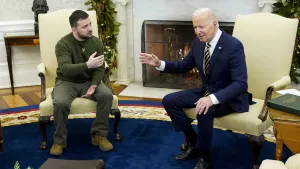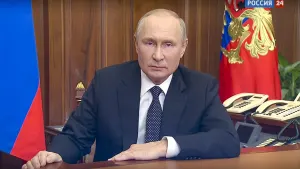More Stories

KYIV, Ukraine - Russian troops began leaving the Chernobyl nuclear plant after soldiers got “significant doses" of radiation from digging trenches at the highly contaminated site, Ukraine’s state power company said Thursday as fighting raged on the outskirts of Kyiv and other fronts.
Energoatom gave no details on the condition of the troops or how many were affected. But it said the Russians had dug in in the forest inside the exclusion zone around the now-closed plant, the site in 1986 of the world's worst nuclear disaster.
LIVE UPDATES: The Russian invasion of Ukraine
The troops “panicked at the first sign of illness,” which “showed up very quickly,” and began preparing to leave, Energoatom said.
There was no immediate comment from the Kremlin.
Russian forces seized the Chernobyl site in the opening stages of the Feb. 24 invasion, raising fears that they would cause damage or disruption that could spread radiation. The workforce at the site oversees the safe storage of spent fuel rods and the concrete-entombed ruins of the exploded reactor.
HOW TO HELP: Ways to help Ukraine
The reported pullout came amid continued fighting and indications that the Kremlin is using talk of de-escalation as cover while regrouping and resupplying its forces and redeploying them for a stepped-up offensive in eastern Ukraine.
Ukrainian President Volodymyr Zelenskyy said Ukraine is seeing “a buildup of Russian forces for new strikes on the Donbas, and we are preparing for that."
Meanwhile, a convoy of buses headed to Mariupol in another bid to evacuate people from the besieged port city after the Russian military agreed to a limited cease-fire in the area. And a new round of talks aimed at stopping the fighting was scheduled for Friday.
The Red Cross said its teams were headed for Mariupol with medical supplies and other relief and hoped to take civilians out of the beleaguered city.
Tens of thousands have managed to get out of Mariupol in the past few weeks by way of humanitarian corridors, reducing its population from a prewar 430,000 to an estimated 100,000 as of last week, but other efforts to relieve the city have been thwarted by continued Russian attacks.
At the same time Thursday, Russian forces shelled Kyiv suburbs, two days after the Kremlin announced it would significantly scale back operations near both the capital and the northern city of Chernihiv to increase trust between the two sides.
Britain’s Defense Ministry also reported "significant Russian shelling and missile strikes” around Chernihiv. The area’s governor, Viacheslav Chaus, said Russian troops were on the move but may not be withdrawing.
Russia’s military also reported conducting strikes on Ukrainian fuel supplies late Wednesday, and Ukrainian officials said there were artillery barrages in and around the northeastern city of Kharkiv over the past day.
Despite the fighting, Russia said it committed to a cease-fire along the route from Mariupol to the Ukraine-held city of Zaporizhzhia.
Ukrainian Deputy Prime Minister Iryna Vereshchuk said 45 buses would be sent to collect civilians who have suffered some of the worst privations of the war.
Food, water and medical supplies have all run low during a weekslong blockade and bombardment of the city. Civilians who have managed to leave have typically done so using private cars, but the number of drivable vehicles left in the city has dwindled and fuel is low.
“It’s desperately important that this operation takes place,” the Red Cross said in a statement. “The lives of tens of thousands of people in Mariupol depend on it.”
Talks between Ukraine and Russia were set to resume Friday by video, according to the head of the Ukrainian delegation, David Arakhamia, fix weeks into a war that has seen thousands die and a staggering 4 million Ukrainians flee the country.
But there seemed little faith that the two sides would resolve the conflict any time soon, particularly after the Russian attacks in zones where it had offered to scale back.
Russian President Vladimir Putin said that conditions weren’t yet “ripe” for a cease-fire and that he wasn’t ready for a meeting with Zelenskyy until negotiators do more work, Italian Premier Mario Draghi said after a telephone conversation with the Russian leader.
NATO Secretary-General Jens Stoltenberg said alliance intelligence indicates Russia is not scaling back its military operations in Ukraine but is instead trying to regroup, resupply its forces and reinforce its offensive in the Donbas.
“Russia has repeatedly lied about its intentions,” Stoltenberg said. At the same time, he said, pressure is being kept up on Kyiv and other cities, and “we can expect additional offensive actions bringing even more suffering.”
The Donbas is the predominantly Russian-speaking industrial region where Moscow-backed separatists have been battling Ukrainian forces since 2014. In the past few days, the Kremlin, in a seeming shift in its war aims, said that its “main goal” now is gaining control of the Donbas, which consists of the Donetsk and Luhansk regions, including Mariupol.
The top rebel leader in Donetsk, Denis Pushilin, issued an order to set up a rival city government for Mariupol, according to Russian state news agencies, in a sign of Russian intent to hold and administer the city.
In the Kyiv suburbs, regional governor Oleksandr Palviuk said on social media that Russian forces shelled Irpin and Makariv and that there were battles around Hostomel. Pavliuk said there were Ukrainian counterattacks and some Russian withdrawals around the suburb of Brovary to the east.
Also, Ukraine’s emergency services said the death toll had risen to 20 in a Russian missile strike Tuesday on a government administration building in the southern city of Mykolaiv.
As Western officials search for clues about what Russia's next move might be, a top British intelligence official said demoralized Russian soldiers in Ukraine are refusing to carry out orders and sabotaging their equipment and had accidentally shot down their own aircraft.
In a speech in Australia, Jeremy Fleming, head of the GCHQ electronic spy agency, said Putin had apparently “massively misjudged” the invasion.
U.S. intelligence officials have concluded that Putin is being misinformed by his advisers about how badly the war is going because they are afraid to tell him the truth.
Kremlin spokesman Dmitry Peskov said that the U.S. is wrong and that “neither the State Department nor the Pentagon possesses the real information about what is happening in the Kremlin.”
More from News 12
2:41

Lindenhurst church hosts 24-hour vigil for those affected by war in Ukraine
1:59

15-year-old girl transfers to Hudson Valley to play basketball due to war in Ukraine

Zelenskyy thanks 'every American,' sees 'turning point'
0:30

Blakeman presents honorary citation to Ukraine consulate general after countywide gun drive

President Biden pledges $2.9B in food security aid amid Ukraine war
